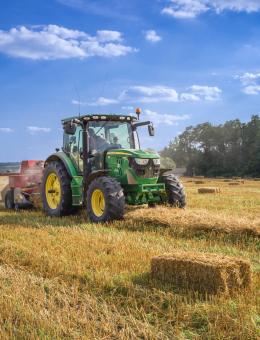
BUDGET MEASURE WHICH WILL HAVE HUGE IMPACT ON FARMING
Published 2 November 2024
This week’s Budget was always going to be painful for businesses, and so it turned out, writes Simon Evans. And hidden away behind the headlines was a significant change which will have a major impact in the farming world.
Unsurprisingly, it is the measures that will add immediate cost to employing people which have attracted the greatest attention. A rise in the National Living Wage of 6.7% (and one of 16.3% for 18-20 year-olds), coupled with a 1.2% hike in employer’s national insurance contributions and a huge cut in the threshold at which employers start to pay NI, means that employing someone on full-time minimum wage is going to cost over £2,500 a year more in April 2025 than it does now.
But it is changes to Agricultural Property Relief which may have the biggest impact on rural businesses. Introduced in 1984, APR allows family farms to be passed from one generation to the next with certain exemptions limiting inheritance tax. Rachel Reeves announced on Wednesday that from 2026, only the first £1 million in value will be exempt; everything after that will be taxed at 20% (as opposed to the full IHT rate of 40%).
Her claim that APR ‘will continue to protect small family farms’ is self-evidently not true expect for the very tiniest concerns: £1 million equates to only around 50 acres and a farmhouse, not including any equipment.
Given that you can’t plan for when you die, this means that every farmer should be thinking about their succession plan right now, and not trusting to luck that the farm won’t have to be broken up and sold when they are no longer about. Whether it’s putting life assurance in place to pay for any inheritance tax liability or making exempt lifetime gifts at least seven years before they die, it is suddenly time to go to work on succession. The new tax regime comes into effect in just 17 months, which is little enough time to mitigate its effects.
Just to make things worse, Business Asset Disposal Relief, often called ‘Entrepreneur’s Relief’, was also in the Chancellor’s crosshairs. Currently this allows business owners to pay just 10% capital taxes on the first £1 million when they dispose of their business; from April next year the figure will be 14%, and from April 2026 it will be equalised with the basic rate of capital gains tax, at 18%.
Amid all this doom and gloom, there were just two glimmers of good news. The first is that fuel duty has been frozen for another year, including the additional 5p a litre discount which was due to come to an end in April. And if all this economic misery is too much for you, at least you can drown your sorrows with a pint, which now costs a whole penny less than it did last week.
Share this story
Arnolds Keys Blog

REFLECTIONS ON REACHING 50 NOT OUT
1 November 2024
Regular readers of the EDP property supplement will have noticed that I celebrated something of a milestone last month: 50 years working for the same firm of estate agents, writes... Read more >

DON’T LET THE TAX TAIL WAG THE INVESTMENT STRATEGY DOG
16 October 2024
It is just a fortnight now until Rachel Reeves introduces the first Labour Budget for 14 years, probably the first socialist leaning budget since the 1970s, writes Guy Gowing. Read more >

NORTH NORFOLK ESTATE AGENT REACHES 50 NOT OUT
14 October 2024
A north Norfolk estate agent is celebrating 50 years working for the same firm – and says he still gets the same buzz out of closing a sale as he... Read more >

CHANGE IS COMING – WE ALL HAVE TO LIVE WITH IT
11 October 2024
Wednesday saw the second reading of the Renters Rights Bill in the House of Commons, and in reality it was a rather one-sided affair, writes Phil Cooper. Read more >
